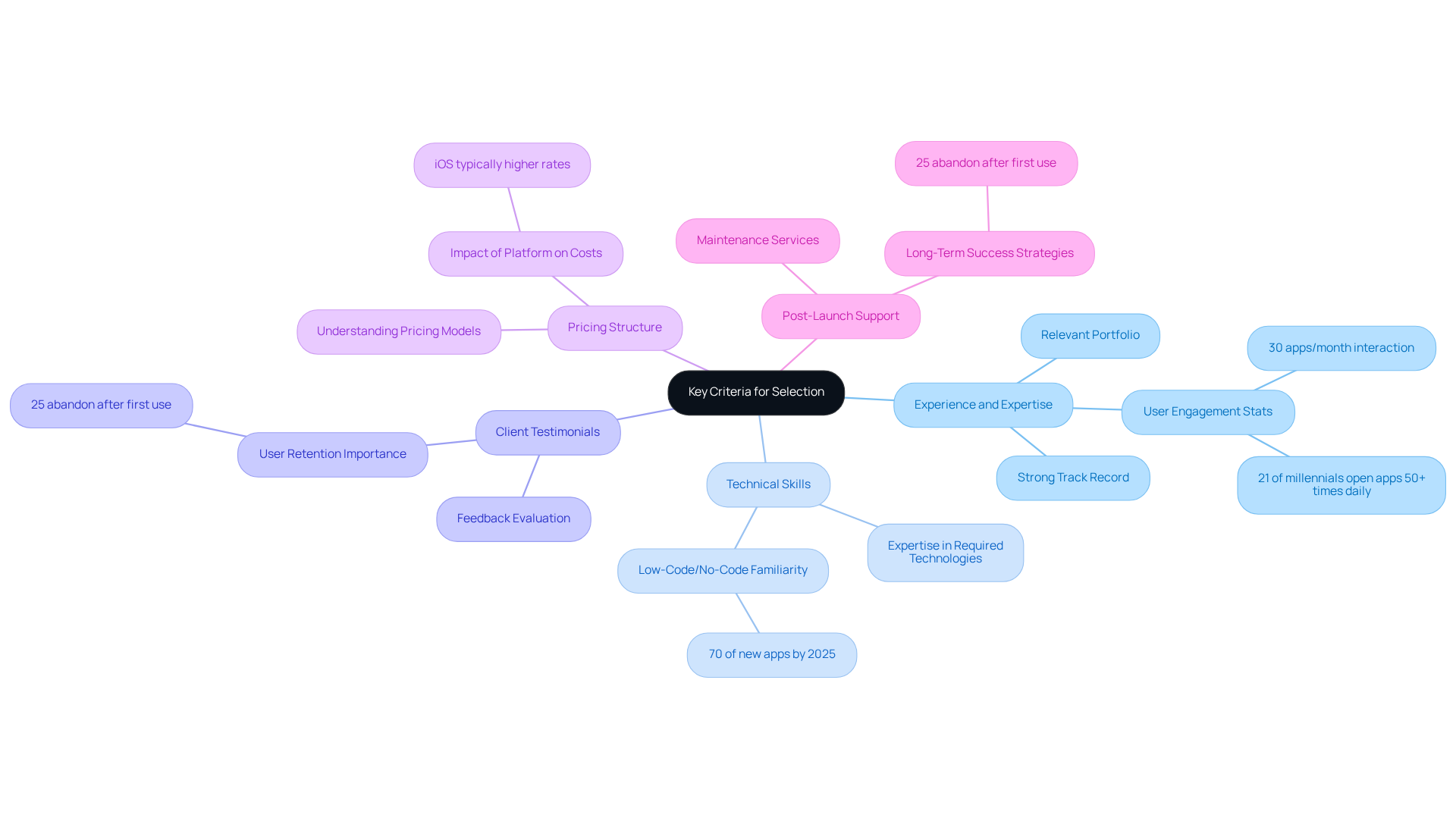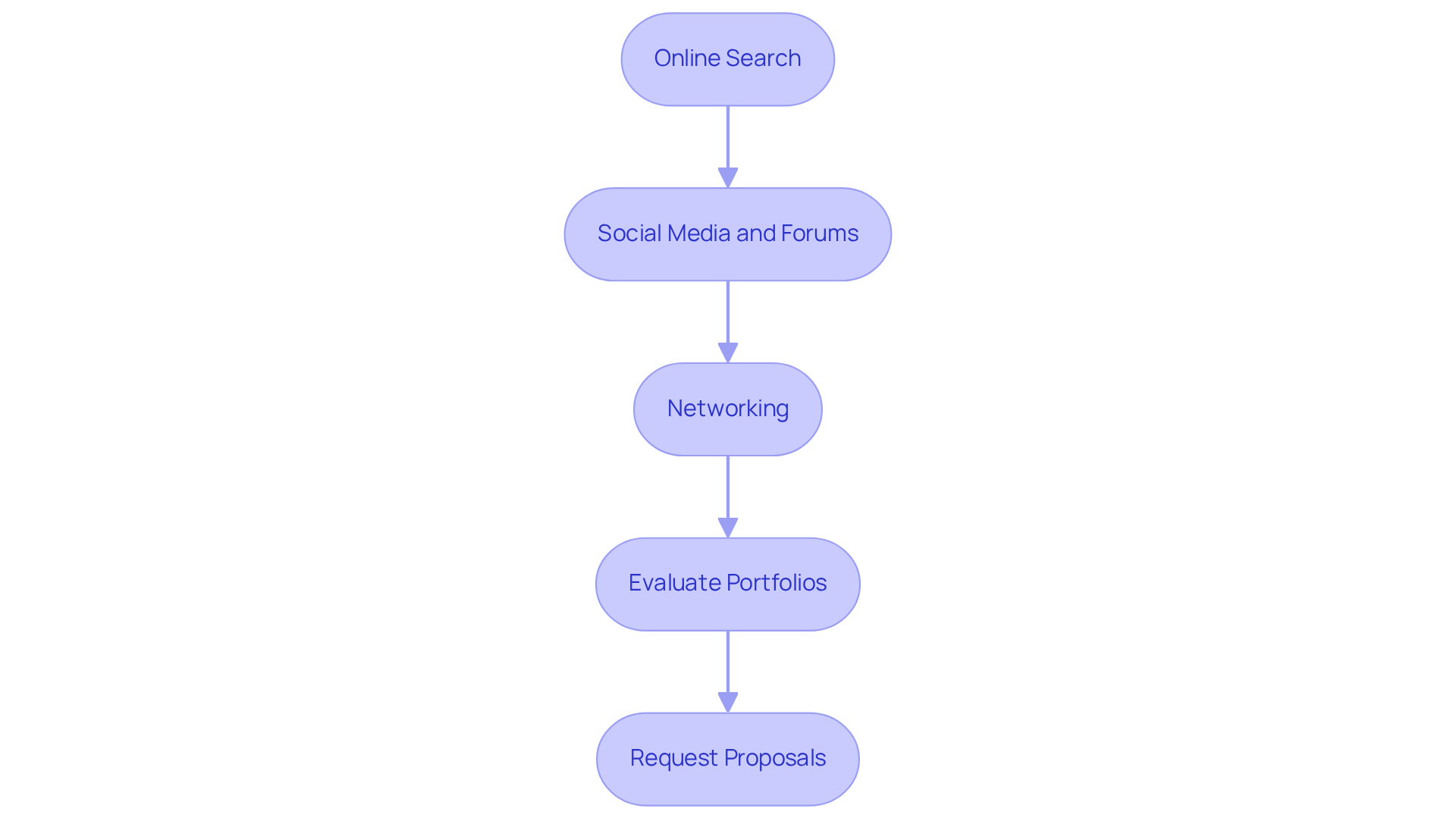AI
our blog
5 Steps to Choose the Right Mobile App Development Company

Overview
Choosing the right mobile app development company is a critical decision that requires careful evaluation of several key factors. It is essential to assess:
- Their experience
- Technical skills
- Client testimonials
- Pricing structure
- Post-launch support
Furthermore, understanding these criteria, alongside conducting thorough research and evaluating communication practices, is vital. This approach will help ensure a successful partnership that effectively meets your app development needs.
Introduction
Selecting the right mobile app development company presents a significant challenge, particularly in today's rapidly evolving digital landscape, where the global mobile app market is projected to reach an astounding $2.2 trillion by 2030. Given the multitude of options available, it is imperative to grasp the fundamental aspects of mobile app development—from the various types of apps to the essential development processes. This understanding is crucial for making an informed decision.
What, then, are the key criteria that can distinguish a successful partnership from a costly misstep? This guide explores the essential steps for selecting a mobile app development company that not only meets project requirements but also aligns with long-term business objectives.
Understand Mobile App Development Basics
Mobile app creation entails the design of software applications specifically tailored for mobile devices such as smartphones and tablets. Understanding the following key concepts is essential:
-
Types of Mobile Apps: It is crucial to familiarize yourself with the three primary types of mobile apps: native (developed for specific platforms like iOS or Android), web (accessible via browsers), and hybrid (a combination of both). Hybrid apps are particularly attractive due to their cross-platform functionality, offering a cost-effective solution for numerous businesses.
-
Creation Platforms: Recognizing the differences between iOS and Android platforms will significantly influence your choice of a mobile app development company. Android dominates the global market, accounting for over 70% of total app downloads, while iOS is recognized for generating higher revenue despite a lower volume of downloads. As Nayan Sharma states, "A balanced strategy ensures global visibility, higher engagement, and diversified revenue streams."
-
Lifecycle of Creation: Familiarize yourself with the phases of app creation, which include ideation, design, creation, testing, and deployment. Understanding these stages will enable you to evaluate the capabilities of potential partners effectively. The app creation process is vital, particularly considering that mobile users spend over 4.5 hours daily on apps, underscoring the need for effective user engagement.
By grasping these fundamentals, you will be better positioned to engage in meaningful discussions with a mobile app development company. Moreover, it is imperative to acknowledge that the global mobile app market is projected to reach $2.2 trillion by 2030, highlighting the significance of investing in mobile app creation. Additionally, customer retention remains a challenge, as only 26% of users return to an app the day after installation, emphasizing the necessity for a robust user experience.

Identify Key Criteria for Selection
When selecting a mobile app development company, several key criteria should guide your decision-making process:
-
Experience and Expertise: Prioritize companies with a strong track record in developing apps that align with your vision. A portfolio showcasing relevant projects is essential, especially considering that the average smartphone user interacts with around 30 apps monthly. This statistic highlights the competitive landscape. Notably, 21% of millennials open an app 50 or more times daily, underscoring the need for experienced developers to create engaging applications. At Studio Graphene, we support you throughout your complete digital journey, ensuring that our knowledge results in successful app creation.
-
Technical Skills: Ensure the company possesses the necessary expertise in the technologies and platforms you require, whether it be iOS, Android, or cross-platform solutions. With 70% of new applications expected to be developed using low-code or no-code technologies by 2025, familiarity with these tools can significantly enhance development efficiency. As a mobile app development company, Studio Graphene's highly accredited and cloud-certified team is well-versed in these technologies, ensuring your project is in capable hands and that our services enhance your app's functionality and overall experience.
-
Client Testimonials: Examine feedback and testimonials from prior clients to evaluate satisfaction levels and the organization's reliability. Thriving businesses frequently possess a background of favorable responses, showcasing their dedication to quality and customer experience. It's crucial to note that about 25% of users abandon an app after a single use, emphasizing the importance of user retention strategies. Studio Graphene's focus on comprehensive Discovery, Design, and Build services ensures that we address these challenges effectively.
-
Pricing Structure: Understand the company's pricing model—whether fixed price, hourly rate, or another structure—and ensure it aligns with your budget. The choice of platform can impact costs, with iOS development typically incurring higher rates. Studio Graphene offers transparent pricing structures tailored to your specific needs, ensuring you receive value for your investment.
-
Post-Launch Support: Inquire about the support and maintenance services available after the app's launch. Continuous support is essential for long-term success, as client retention strategies are important; research indicates that approximately 25% of individuals abandon an app after just one use. At Studio Graphene, we provide robust post-launch support to help you navigate the evolving digital landscape, ensuring that our services contribute to sustained user engagement and retention.
By setting these standards, you can effectively filter potential collaborators, ensuring that you select a mobile app development company like Studio Graphene, which is capable of delivering a successful app customized to your requirements.

Research Potential Development Companies
To effectively research potential mobile app development companies, consider the following steps:
- Online Search: Utilize search engines and platforms like Clutch and GoodFirms to identify top-rated app development firms. Focus on those with robust portfolios and favorable reviews, as these indicators often reflect their reliability and expertise. The mobile app market is projected to reach $756 billion by 2027, which emphasizes the importance of selecting a capable mobile app development company in this growing industry.
- Social Media and Forums: Engage with social media platforms and forums such as Reddit and LinkedIn to gather insights and recommendations from industry professionals and peers. These discussions can offer valuable insights on various businesses, especially in a competitive environment where 88% of mobile time is spent in applications.
- Networking: Participate in industry events, webinars, or meetups to connect with fellow entrepreneurs. Networking can provide referrals for trustworthy firms, broadening your choices. According to Hiren Kalariya, Co-Founder & CEO, 'About 25% of users abandon an app after a single use,' which emphasizes the need for a strong mobile app development company as a development partner.
- Evaluate Portfolios: Carefully review the portfolios of selected firms to assess their design quality and functionality. Look for projects that resonate with your vision and requirements, as this alignment is crucial for successful collaboration. Case studies, such as the "Impact of UI/UX Design on Mobile App Success," illustrate how effective design can significantly boost conversion rates.
- Request Proposals: After refining your list, contact the chosen firms for proposals. This step allows you to compare their offerings, pricing, and overall approach, facilitating a more informed decision.
By performing comprehensive research, you can create a shortlist of firms that are well-prepared to fulfill your project requirements, ultimately resulting in a successful app creation experience.

Evaluate Development Processes and Methodologies
When evaluating potential mobile app development companies, it is crucial to consider the development processes and methodologies they utilize. Understanding the distinctions between Agile and Waterfall methodologies is essential. Agile, characterized by its iterative and flexible nature, is often favored for projects that require frequent updates and adaptability. In contrast, Waterfall follows a linear and sequential approach, which may be less suitable for dynamic environments. Agile methodologies enable proactive management of regulatory and compliance readiness, ensuring that organizations meet industry standards, such as GDPR or HIPAA, throughout the creation process.
Inquire about the specific tools and software utilized for project management, such as Jira or Trello. Effective project management tools are vital for enhancing communication and tracking progress. Notably, 71% of organizations utilize Agile in their software development lifecycle, and 86% of software developers worldwide employ Agile methodologies, indicating a strong preference for tools that support Agile practices. Furthermore, two-thirds of organizations utilize Atlassian Jira for Agile project management, demonstrating its popularity in the sector.
It is important to inquire about the organization's testing procedures to ensure thorough quality assurance before launch. This should include:
- Unit testing
- Integration testing
- Client acceptance testing
These are essential for delivering a dependable app.
Assess how the organization incorporates client input throughout the creation process. Regular feedback loops are essential for refining the final product, as they allow for adjustments based on user needs and expectations. As Hiren Kalariya states, "Agile focuses on customer feedback at every stage," emphasizing the importance of this practice.
By fully comprehending these progression processes, you can choose a mobile app development company that aligns with your project management approach and expectations, ultimately resulting in a successful mobile app creation experience.

Assess Communication and Collaboration Practices
To effectively evaluate the communication and collaboration practices of potential mobile app development companies, consider these key aspects:
-
Communication Channels: Inquire about the primary communication channels utilized, such as email, Slack, or video calls, and the frequency of updates. Effective communication is crucial; studies indicate that organizations with strong communication practices are 4.5 times more likely to retain top talent.
-
Team Structure: Understand the team composition and identify your main point of contact. A well-defined team structure, typically including roles like a dedicated project manager, UI/UX designer, and developers, is essential for ensuring alignment with business goals and user needs. For mid-sized business apps, a recommended setup includes:
- 2 Flutter Developers
- 1 Backend Developer
- 1 UI/UX Designer
- 1 QA
- 1 Project Manager
-
Collaboration Tools: Ask about the collaboration tools employed, such as Google Workspace or Asana, and how they promote transparency and accountability. Tools like Vouch and Slack are favored for enhancing communication and fostering real-time collaboration, significantly improving project outcomes.
-
Cultural Fit: Assess the company's culture and values to ensure alignment with your own. A strong cultural fit can enhance collaboration and project success, as effective communication is not merely about information exchange but also about building relationships and ensuring clarity.
By thoroughly evaluating these practices, you can select a mobile app development company that emphasizes effective communication and collaboration, ultimately leading to a successful project outcome.

Conclusion
Choosing the right mobile app development company is not just a decision; it is a pivotal choice that can profoundly influence the success of an app project. A solid grasp of mobile app development fundamentals—including app types, creation platforms, and the app lifecycle—serves as the foundation for meaningful discussions with potential partners. This knowledge empowers organizations to evaluate companies more effectively, taking into account their experience, technical expertise, client testimonials, pricing structures, and post-launch support.
Key criteria for selection encompass:
- A thorough assessment of a company's experience and expertise
- An understanding of their technical capabilities
- An evaluation of client feedback
Furthermore, conducting extensive research into potential firms—through online searches, social media engagement, and networking—can yield invaluable insights. Evaluating development processes, methodologies, and communication practices is essential to ensure alignment with project goals and expectations.
Ultimately, the importance of selecting the right mobile app development partner cannot be overstated. As the mobile app market continues to expand, making an informed choice not only enhances the likelihood of a successful app launch but also fosters long-term user engagement and retention. By prioritizing these considerations, organizations can confidently embark on their app development journey, paving the way for innovation and success in a competitive landscape.









